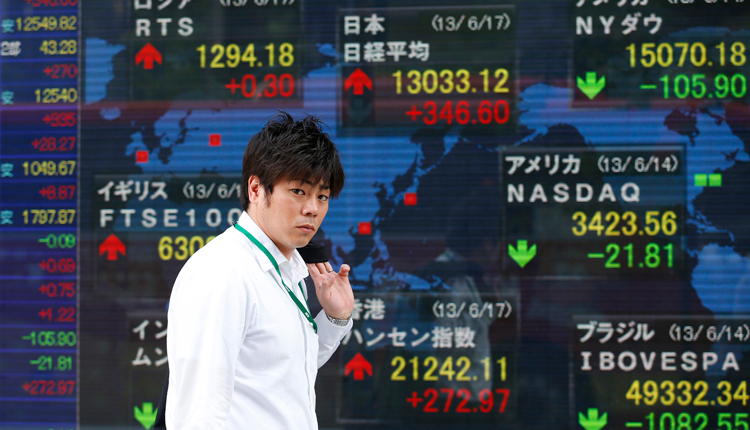Asian markets mostly closed higher on Friday. Meanwhile, China’s trade with the U.S. declined in the first half of the year, amid an impasse between the two economic giants.
The Nikkei 225 in Japan closed 0.2% higher at 21,685.90, while the Topix index fell 0.15% to end its trading day at 1,576.31. Over in South Korea, the Kospi advanced 0.29% to close at 2,086.66.
Australia’s slipped 0.29% to close at 6,696.50.
Mainland Chinese stocks rose on the day, with the Shanghai composite up 0.44% to 2,930.55 and the Shenzhen composite 0.506% higher to 1,556.77. The Shenzhen component also gained 0.66% to close at 9,213.38.
Hong Kong’s Hang Seng index added 0.23%, as of its final hour of trading. Overall, MSCI’s broadest index of Asia-Pacific shares outside Japan declined fractionally.
Data on Friday showed that China’s dollar-denominated exports fell 1.3% in June from a year ago while imports fell 7.3% in the same period. Economists polled by Reuters had expected China’s June exports to have declined 2% from a year ago, while imports were expected to have contracted 4.5% from a year earlier.
In the first half of the year, China’s total trade with the U.S. was down 9%, customs data showed.
Singapore is ‘flirting with recession now’
Gross domestic product in Singapore fell 3.4% in the April-June period as compared to the previous quarter on an annualized and seasonally adjusted basis, according to preliminary data released Friday. That widely missed expectations of a 0.1% quarter-on-quarter increase from a Reuters poll.
Compared with a year earlier, GDP grew 0.1% in the second quarter — the slowest year-on-year growth since the second quarter of 2009 — also less than the forecast of a 1.1% expansion in a Reuters poll.
Despite the poorer-than-expected data print, Singapore’s markets recovered from their earlier slip, with the Straits Times Index trading 0.1% higher in the afternoon.
“This is pretty bad,” Sian Fenner, lead Asia economist at Oxford Economics, told CNBC’s “Squawk Box” on Friday. “We were looking for a negative contraction (quarter-on-quarter) just given the fact that we have seen the manufacturing numbers being so weak, we have seen the export figures contract as well, but this was a big miss.”
“Singapore is … really flirting with recession now,” Fenner said.
Currencies and oil
The U.S. dollar index, which tracks the greenback against a basket of its peers, was at 96.913 after touching an earlier high of 97.116.
The traded at 108.34 against the dollar after weakening from levels below 108.0 in the previous session, while the changed hands at $0.6999 after trading below $0.695 earlier in the week.
Oil prices rose in the afternoon of Asian trading hours, with the international benchmark Brent crude futures contract adding 0.78% to $67.04 per barrel and U.S. crude futures rising 0.73% to $60.64 per barrel.
Source: CNBC


